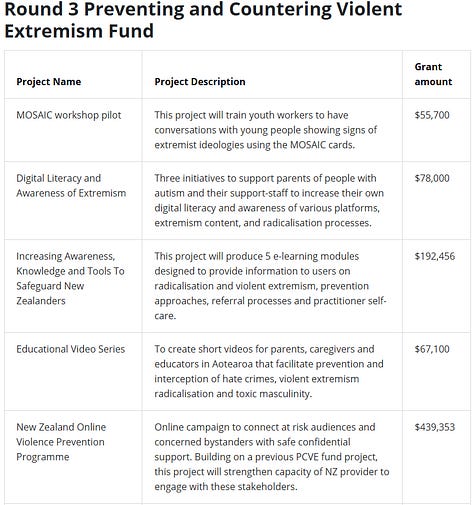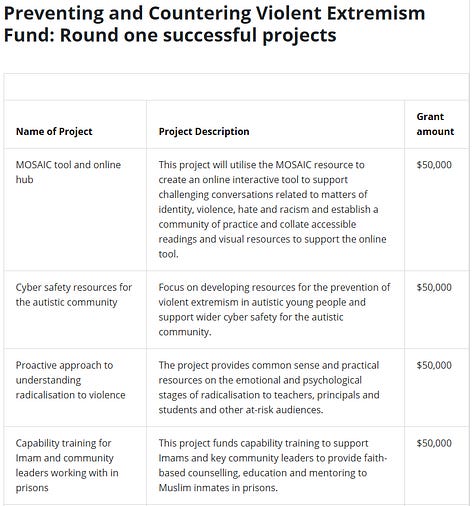The Government was quietly funding online propaganda machines through the “Preventing and Countering Violent Extremism Fund”
While many New Zealanders believe they’re simply debating passionate activists online, the reality may be far more coordinated. It turns out, some of the loudest voices parroting the government's narrative might not just be opinionated citizens. They could have been on the payroll.
Hidden away in the Department of the Prime Minister and Cabinet (DPMC) website is a little-known scheme called the Preventing and Countering Violent Extremism (PCVE) Fund. On the surface, it looks like a fund dedicated to national security and public safety. But dig deeper and a far more sinister picture begins to emerge.
This isn’t just about counter-terrorism. This is about controlling the narrative.
Is the Government funding online thought police?
The PCVE fund claimed to support “grassroots and community-led initiatives” to address extremism. But the definition of extremism has become so vague and politically charged that it now seems to include anyone who dares question government policy. Whether it’s opposition to Three Waters, critique of co-governance, concerns about immigration or frustration with vaccine mandates, dissent is increasingly labelled as dangerous.
Rather than directly censoring people through legislation, the government appears to have outsourced the job to community groups, “activists,” and social media influencers. And they were doing it with taxpayer money.
Many of these groups operate on Facebook, TikTok, Instagram and X. Their job was clear: shut down dissenting voices, label alternative opinions as “disinformation,” and push government-approved messaging under the disguise of “community outreach” or “digital resilience.”
The government was not just tolerating this. It is actively encouraging and funding it.
You won’t believe what they are funding
Here is a closer look at just a few of the absurd and highly questionable projects funded under the PCVE scheme. You decide whether these are legitimate uses of public money or little more than propaganda dressed up as prevention.









1. Cyber safety resources for the autistic community
“Focus on developing resources for the prevention of violent extremism in autistic young people and support wider cyber safety for the autistic community.”
Amount: $50,000
Translation: The government is suggesting autistic youth are a potential extremist threat that needs to be reprogrammed. This is offensive, dehumanising and completely disconnected from reality.
2. Building capability for Muslim leaders
“This project builds capability of imams and religious leaders to understand the root causes of violent extremism, recognise concerning behaviours, and develop narratives that counter extremist messaging.”
Amount: Not disclosed
Translation: The government is stepping into religious spaces, coaching spiritual leaders on what they should think, say, and teach. That is not prevention, it is state interference in faith.
3. Countering media content to increase resistance to mis/disinformation
“This project will focus on developing counter narratives, media content and artefacts designed to increase resistance to mis/disinformation.”
Amount: $50,000
Translation: This is taxpayer-funded propaganda. Groups are being paid to push government messaging while discrediting alternative media and independent journalists.
4. Digital inclusion to counter radicalisation
“The project uses digital storytelling to address identity-based harms and deliver digital skills to Māori, Pacific and Muslim youth.”
Amount: $50,000
Translation: Another project aimed at “correcting” youth voices in specific communities. Rather than empowering diverse opinions, this is about controlling which voices get heard.
5. Online bystander training to disrupt hate-based extremism
“This initiative builds the ability of people online to intervene when they see hate, extremism or disinformation.”
Amount: $49,950
Translation: The government is funding groups to train online snitches. This turns average citizens into digital enforcers, reporting and attacking anyone who questions mainstream narratives.
6. Counter-extremism arts project
“Using creative arts to explore identity and belonging, helping to prevent extremism by building strong self-identities.”
Amount: $50,000
Translation: Another vanity project where public money is thrown at abstract nonsense under the illusion that painting or dancing somehow stops terrorism.
Manufactured consent in a democratic disguise
In a democracy, citizens are supposed to hold the government to account. That balance collapses when the government starts paying people to silence their critics. The PCVE fund looks less like a public safety measure and more like a political weapon. It funds a growing network of ideologically aligned groups whose job is to stamp out “unacceptable” views before they gain traction.
Think back to the coordinated pile-ons you see on Facebook whenever someone raises a legitimate concern about government policy. The same people show up, using the same talking points, usually attacking the person rather than addressing the issue. Now it makes sense. Some of these people could be working under a taxpayer-funded mandate to discredit alternative narratives.
When political power aligns with digital enforcement, free speech becomes the first casualty.
The real extremism is coming from the top
While New Zealanders struggle with housing, rising crime and unaffordable living, the government was quietly handing out money to activists and NGOs so they can police your thoughts online. All under the false banner of public safety.
The Preventing and Countering Violent Extremism Fund is not a tool to protect the public. It is a tool to protect the government from criticism. And in doing so, it threatens the very foundation of a free and open society.
Next time you find yourself in a debate with someone parroting the official line, ask yourself - are they passionate, or just paid?
🔒 EXTRA FOR SUBSCRIBERS: What the Government doesn’t want you asking
Thank you for supporting this investigation. Here’s what didn’t make it into the main piece, but needs to be said.
One of the most disturbing elements of the Preventing and Countering Violent Extremism (PCVE) Fund is how deliberately vague it all is. The funding categories are woolly, the objectives are buried in layers of buzzwords, and there is virtually no public record of measurable outcomes…








